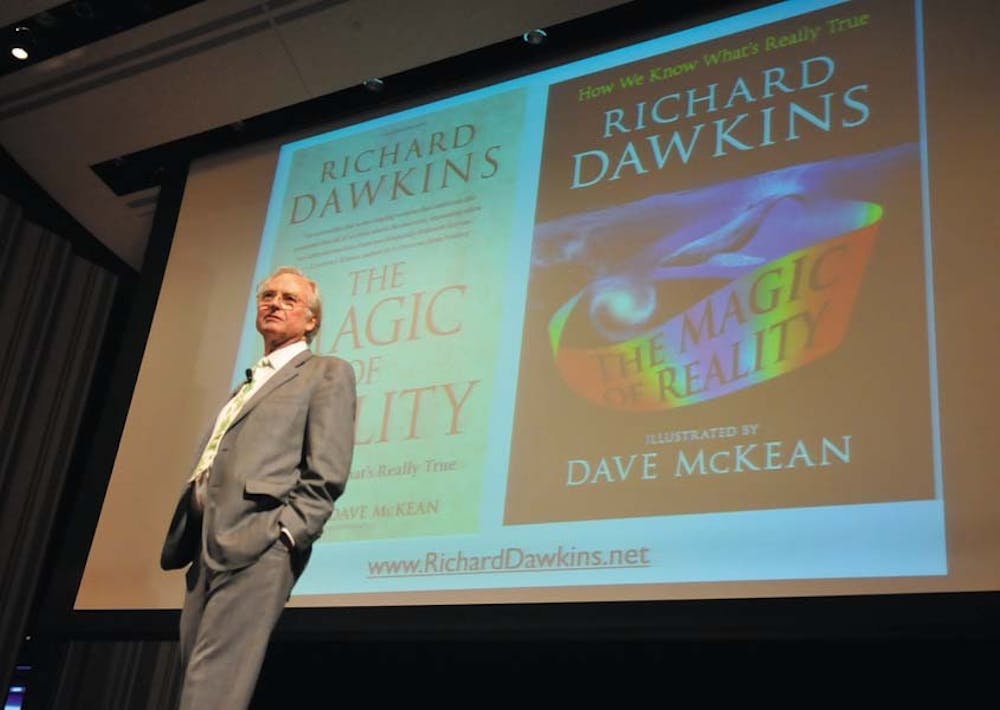
Penn students, Philadelphia residents and even one brave soul who flew in from Atlanta, Ga. crowded into Irvine Auditorium last night to hear a polarizing figure speak.
Richard Dawkins — evolutionary biologist and former Oxford University professor — addressed a crowd of about 1,500 with a lecture titled “Proof, Science and Skepticism” for the Philomathean Society’s Annual Oration, in celebration of the group’s 200th anniversary.
In honor of Dawkins’ contributions to his field, he was awarded the University of Pennsylvania Museum of Archaeology and Anthropology’s Wilton Krogman Award. He is the fourth recipient of this award, joining the ranks of such distinguished researchers as Donald Johanson, who discovered the 3.2 million year-old hominid fossil “Lucy.”
Dawkins’ oration, however, focused primarily on a chapter of his new book, “The Magic of Reality: How We Know What’s Really True,” titled “Why Bad Things Happen.” Dawkins, a pioneer of the gene-centric view of evolution and the originator of the popular internet term “meme,” discussed the nature of misfortunes both biological and physical, emphasizing the differences between the two.
“The universe isn’t out to get you,” Dawkins said. “It doesn’t know or care about your existence.”
However, in the evolutionary arms race between predator and prey, Dawkins added, something really is developing better ways to “get you.”
Dawkins then turned his attention to the nature of proof in biology and more broadly, to the role of science in general. While science often lacks the neatly rigorous proofs of mathematics, there are certain principles — such as a common ancestor for all of mankind — that can be proved by deductive reasoning from basic scientific axioms, Dawkins said.
If you go back far enough and find the primitive fish that was your ancestor, he claimed, “My fish has to be your fish has to be everyone’s fish…If you go back far enough, everyone is either the ancestor of all modern humans or the ancestor of none of them. There is no intermediate.”
While Dawkins is a prominent contributor to the field of evolutionary biology, he is perhaps more famous for his outspoken atheism. College sophomore and Philo’s Second Censor Emmett Wynn said, “Dr. Dawkins is one of the most prominent and most outspoken critics of an idea which is highly influential and yet still unproven.”
In the question and answer session following Dawkins’ oration, students asked him to clarify his stance on several issues relating to this second role — from his opinion on transhumanism to his thoughts on watering down science for public consumption. Dawkins claimed throughout that science was the ultimate explanation for natural phenomena and that there is no role for faith in finding the truth.
“Science has the magic — the magic of reality,” Dawkins said. “Don’t be lazy, cowardly [and] defeatist enough to say ‘I don’t understand it, so it must be supernatural’…The proper and brave response is to say ‘We don’t know yet, but we’re working on it.’”
Wynn and fellow Philo member Ben Marchi, a Wharton and College sophomore, both appreciated Dawkins’ merging of the scientific and more philosophical, atheist perspective in his talk.
“I thought it was really perceptive of him to say that when science can’t explain something, you shouldn’t just go to mythology, you find a better science,” Marchi said.
At one point, though, Dawkins did retreat from one of his previous comments. At Reason Rally 2012 — a national atheist event — he had encouraged atheists to “ridicule” Catholics. In hindsight, he confessed, “I think I did go too far,” though he claimed that he had not intended for ridicule to mean name-calling but more as a call for “subtle satire.”
“Dr. Dawkins is someone who can provoke conversations,” said College senior Paul Mitchell, the director of the oration. He cited American atheists and the myriad groups — including the Office of the Chaplain — that contributed to the event’s success.
Penn’s enthusiasm for Dawkins, however, posed a logistical challenge for the oration’s organizers.
As the event approached, Mitchell received more than 500 phone calls from Penn students hoping to attend. The 1,500 available tickets had sold quickly, so unticketed students had to wait outside.
For those who missed Dawkins’ oration, though, a full recording will be made available online.
The Daily Pennsylvanian is an independent, student-run newspaper. Please consider making a donation to support the coverage that shapes the University. Your generosity ensures a future of strong journalism at Penn.
DonatePlease note All comments are eligible for publication in The Daily Pennsylvanian.







